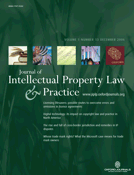CLIP conference: Intellectual Property and Private International Law
As we announced in the last posting concerning the CLIP group, they are preparing an international conference on issues arising where in the intersection of intellectual property law and private international law. The conference program includes the following topics and speakers:
Are there any Common European Principles of a Private International Law with regard
to Intellectual Property?
Prof. Dr. Annette Kur, Max Planck Institute for Intellectual Property Law, Munich
The ALI Principles Governing Jurisdiction, Choice of Law and Judgments in
Transnational Intellectual Property Disputes
Prof. Dr. Rochelle C. Dreyfuss, New York University
“Contracts Relating to Intellectual or Industrial Property Rights” under the Rome I
Proposal
Prof. Dr. Matthias Leistner, University of Bonn
The Law Applicable to Non-Contractual Obligations Arising from an Infringement of
Registered IP Rights
Prof. Dr. Peter Mankowski, University of Hamburg
The Law Applicable to Infringements of Non-Registered IP Rights
Prof. Dr. Haimo Schack, University of Kiel
Extraterritorial Application of IP Law – An American View
Prof. Dr. Graeme B. Dinwoodie, Chicago-Kent College of Law
The Private International Law of IP and of Unfair Commercial Practices: Coherence or
Divergence?
Prof. Dr. Pedro Miguel de Asensio, University Complutense of Madrid
Cross Border IP Litigation – Still an Issue under the Brussels I Regulation?
Prof. Dr. Paul Torremans, University of Nottingham/University of Ghent
A Spider without a Web? Multiple Defendants in IP Litigation
Prof. Dr. Marcus Norrgård, Swedish School of Economics and Business
Administration, Helsinki
The Future of Centralised Patent Litigation in Europe – Between EPLA and the
Community Patent Regulation
Dr. Stefan Luginbühl, European Patent Office
Jurisdiction in Cases Concerning IP Infringements on the Internet
Dr. Axel Metzger, Max-Planck Institute for Comparative and International Private
Law, Hamburg
The opening speach on behalf of the DFG Graduate School n. 1148 “Intellectual Property and the Public Domain”, University of Bayreuth belongs to Prof. Dr. Diethelm Klippel, and the introduction into the conference has been entrusted to Prof. Dr. Stefan Leible and Prof. Dr. Ansgar Ohly of the University of Bayreuth. The conference will take place in Bayreuth, Germany on 4 and 5 April 2008.
The detailed program of the conference can be downloaded here.
%5B3%5D.jpg)
